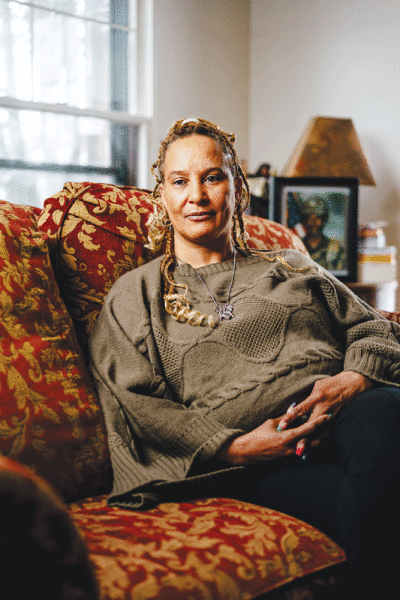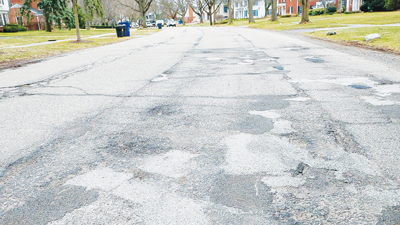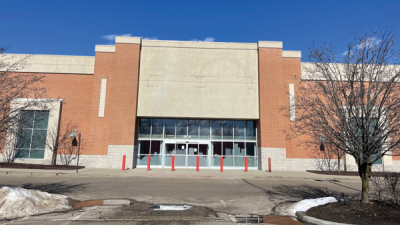
Tawanda Hall lost her Southfield home when Oakland County took it to settle a tax debt, but she was not refunded the difference in her home’s value.
Photo provided by Pacific Legal Foundation
OAKLAND COUNTY — A federal appellate court has sided with several homeowners who filed a lawsuit against Oakland County, its former treasurer, the city of Southfield, several city officials, and others after their homes — worth far more than the taxes owed — were taken by the county without refunding them for the difference in home equity.
This included the property of Tawanda Hall, whose home was worth close to $300,000 before the county claimed “absolute title” on it in 2018 to satisfy a $22,262 tax debt. The county then sold her home to the city of Southfield for the amount owed in taxes, after which the city sold the home for just $1 to the Southfield Neighborhood Revitalization Initiative, which then resold it for $308,000.
The case, Hall v. Meisner, also includes plaintiffs Curtis Lee, Coretha Lee and Kristina Govan. In 2016, the county foreclosed on the Lees over a $30,547 tax debt. Like Hall, their home was eventually sold to the Southfield Neighborhood Revitalization Initiative, which resold it for $155,000.
As for Govan’s home, the county foreclosed on it for a $43,350 tax debt; its title is now held by the Southfield Neighborhood Revitalization Initiative, but at press time had not been resold.
The Southfield Neighborhood Revitalization Initiative (SNRI) is one of the named defendants. The SNRI worked with Habitat for Humanity Oakland County to demolish or rehab homes. According to cityofsouthfield.com, the aim of the SNRI is “to renew Southfield neighborhoods house by house in an effort to improve and maintain property values for all Southfield residents.”
The SNRI received seed money from the Southfield Non-Profit Housing Corporation (SNHC), which is also a defendant in the case. The SNHC describes itself on its website, snhc.org, as a group that “maintains quality communities for seniors, the disabled, and eligible families.”
Board members of the SNHC include several who are also current city officials, such as Southfield Mayor Kenson Siver, serving as the board president, and Southfield City Administrator Frederick Zorn, serving as board second vice-president. Both are among the named defendants.
Other defendants include Mitchell Simon, board treasurer; E’toile Libbett, board director; Susan Ward-Witkowski, a former city attorney for Southfield; Gerald Witkowski, the code enforcement and eviction administrator for the Southfield Neighborhood Revitalization Initiative; Irv Lowenberg, Southfield’s city treasurer; Andy Meisner, the former county treasurer; as well as Oakland County and the city of Southfield.
The opinion, written by Judge Raymond Kethledge of the U.S. Court of Appeals for the Sixth Circuit, issued Oct. 13, 2022, part of a panel that also included Judge John K. Bush and Judge John Nalbandian — reversed a dismissal of the plaintiffs’ case by the U.S. District Court for the Eastern District of Michigan in Detroit, where it was originally filed in 2020 and argued in 2021.
In his ruling, Kethledge described the process under which the homes were taken and resold — a process he suggested is ultimately unconstitutional. Normally, under state law, a debtor can only have their home taken after a public foreclosure sale. Then, once the home is sold and the debt is paid off, any extra proceeds are returned to the debtor. However, there is one exception to this rule, under the Michigan General Property Tax Act, where the state itself, or any county within it, can take a homeowner’s home when it collects a tax debt, and it can do so without refunding the debtor during the foreclosure process.
“In that respect, the Michigan statute is not only self-dealing: it is also an aberration from some 300 years of decisions by English and American courts, which barred precisely the action that Oakland County took here,” Kethledge wrote.
“The government may not decline to recognize long-established interests in a property as a device to take them,” Kethledge continued. “That was the effect of the Michigan Act as applied to the plaintiffs here, and we agree with the plaintiffs that, on the facts alleged here, the county took their property without just compensation. We therefore reverse the district court’s dismissal of their claim against the county under the Takings Clause of the U.S. Constitution.”
The Takings Clause of the Fifth Amendment of the U.S. Constitution reads, “Nor shall private property be taken for public use, without just compensation.”
While the appellate judges sided with the plaintiffs on the Takings Clause claims, it affirmed the lower court’s dismissal of other claims centered around due process, excessive fines and unjust enrichment.
The defendants are split into three groups, each represented by a different law firm. The SNRI and SNHC, as well as Libbett and Simon, are represented by Pentiuk, Couvreur & Kobiljak, P.C., based in Wyandotte. In a phone interview Dec. 27, 2022, attorney Joe Couvreur said it’s important to understand the separation between his clients and the process that cost the plaintiffs their homes.
“Nobody from the city (of Southfield) has ever had any involvement in the foreclosure process,” Couvreur said. “Foreclosure is not their jurisdiction. The aim of the Southfield Neighborhood Revitalization Initiative is to improve housing stock and stabilize neighborhoods. All sales proceeds made from this venture goes straight back into future projects. No individuals are profiting from this.”
He noted that Oakland County has already filed for a rehearing. He said that all parties were operating within the law. He also anticipates the U.S. Supreme Court will have to settle the question of whether the state law, itself, is constitutional.
A request for comment was left with the Oakland County Treasurer’s Office, as well as the law firm of Seward Henderson PLLC, in Royal Oak, representing Zorn, Siver, Ward-Witkowski, Witkowski and Lowenberg; and the law firm of Giarmarco, Mullins & Horton, P.C., in Troy, representing the Oakland County defendants. These went unanswered by press time.
However, Siver shared some thoughts via email. He echoed Couvreur’s statement that no one from the city profited from the transactions.
“Proceeds from the sale of properties went back into SNRI for renovation or demolition,” Siver said. “My understanding is the SNRI has not turned a profit.”
The mayor said it’s important to keep in perspective the mortgage fraud crisis of 15 years ago, where thousands of homes were dumped by banks at a fraction of their value, and many who obtained a bank-foreclosed home could not afford to maintain them or pay the taxes and water bills. Many of those were then foreclosed, again, by the county. Southfield led the county with the most foreclosed homes, which were being broken into and stripped of copper and other items. The mayor said that the flippers and rental companies who picked up properties did little to improve them, and some homes were even occupied by squatters.
“It had a devastating impact on Southfield neighborhoods. The City Council said ‘enough’ in 2016 and began opting on first right of refusal. Many neighboring communities were doing this prior to Southfield,” Siver said. “Our country has a long, shameful history of throwing away neighborhoods. Southfield is a great community with resources. It moved to block the syndrome.
“The bottom line is these people who are suing, didn’t pay their taxes,” he said. “Neither the city nor the SNRI has profited. For the county treasurers, tax foreclosure is a last resort. Many went years and years without paying. The county foreclosures are signed off by the circuit court. There is a long process for those in arrears to right the situation.”
The homeowners in the lawsuit are represented by Pacific Legal Foundation, a law firm based in Palm Beach, Florida. Christina Martin, a senior attorney there, said in an email that she’s pleased with the Sixth Circuit’s opinion in the case.
“While the government can temporarily seize property to collect a debt, it doesn’t get to take more than it is owed. The government should do what all other debt collectors must do: have a fair sale of the property, pay the debts with the proceeds, and refund the remainder to the former owner,” Martin said.
“The county acknowledges that it would have violated the Constitution if it sold our clients’ homes to the highest bidder and kept windfalls from the sales. But Oakland County claims because it privately sold the homes at a massive discount, it didn’t really take anything from Tawanda Hall, Curtis and Coretha Lee, or Kristina Govan. Fortunately, the Sixth Circuit recognized what everyone already intuitively understands: home equity is private property. The government is not allowed to steal it.”
Martin described the significant hardship experienced by her clients. She said that Hall’s family was devastated by the loss of their home and the life savings built up in it, and that the stress allegedly contributed to the death of Hall’s husband when, sick with pneumonia, he fell at work and suffered a brain injury that ultimately killed him.
She said she’s optimistic her clients will eventually be compensated.
“But to be clear, their case was dismissed, so they still have to go back to the trial court and prove what their homes were worth, and thus what compensation is owed to them,” Martin said. “There is still more work to be done to vindicate their rights.”
 Publication select ▼
Publication select ▼

























